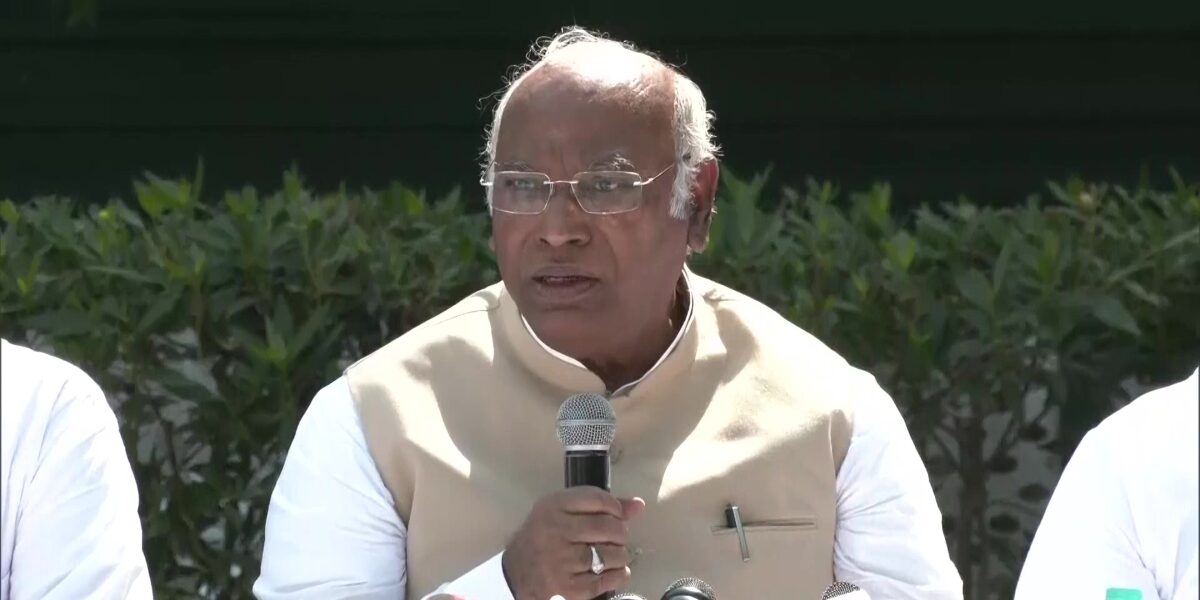The letter was written in response to the high-level committee letter on 18 October last year, seeking suggestions on One Nation One Election.

File photo of Mallikarjun Kharge. (Twitter)
Congress president Mallikarjun Kharge wrote to One Nation One Election High-Level Committee Secretary Dr Niten Chandra expressing his party’s opposition to the idea of simultaneous elections.
“For the sake of maintaining a thriving and a robust democracy, it is imperative that the entire idea must be abandoned and the High Power Committee dissolved,” Kharge wrote in a letter to Chandra dated 17 January.
The letter was written in response to the high-level committee’s letter on 18 October last year seeking suggestions on One Nation One Election.
The Congress accused the committee, headed by former President Ram Nath Kovind, of being “biased without giving substantial representation to the Opposition parties that head various state governments”.
The letter said that the outcomes are “likely to be a pretence since minds have already been made up” citing Kovind’s 2018 address to the joint session of Parliament supporting the same.
The Opposition party contended that frequent elections did not impede development but governance was hindered by the Prime Minister’s frequent involvement in electioneering.
The party dismissed the claim that frequent elections would result in huge losses to the exchequer.
“The argument that cost of conducting elections are extremely high seems baseless. Considering elections are held once in 5 years, the expenses make up less than 0.02 percent of the total Union budget for the preceding 5 years,” Kharge said in the letter.
“When elections are held separately to the state assemblies, the cost of the election is fully borne by the respective states. The expenses for assembly elections may also be similar percentage of their state budgets,” he contented.
Kharge, the Leader of the Opposition in Rajya Sabha, also criticised the Committee on its view on the use of Voter Verifiable Paper Audit Trail (VVPAT) machines.
“As per the ECI (Election Commission of India)itself, a substantial part of the increase in election expenses is due to the use of VVPAT machines. We would like to point out that the ECI is not counting the VVPAT slips or corroborating the final votes with VVPAT slips as demanded by various political parties.
“As you are aware, these slips are unreadable within a few weeks of the results and election petitions are rendered infructuous due to lack of initiative on part of the ECI to make the results transparent,” he contented.
The Congress also challenged the committee’s assertion that the Model Code of Conduct (MCC) disrupts welfare schemes or development projects.
“Pre-existing schemes and projects continue during elections and in any case, the Election Commission can always approve any disbursements of pre-existing schemes. We are shocked to see the committee in its letter misleading the people by saying all welfare schemes or development work will stop due to imposition of MCC,” the letter said.
The letter also criticised the use of the Niti Ayog report for answering the critical question about how to synchronise the terms of state assemblies with the Parliament to implement simultaneous elections in the country.
“The Niti Aayog is neither a constitutional nor a statutory body and the high-level committee should not have referred to it in the first place. The committee should have applied its own mind and made its own recommendations regarding this serious and crucial issue of the terms of state assemblies are addressed,” Kharge added.
The letter also highlighted the tenures of some state Assemblies, including Tamil Nadu and Kerala, be curtailed by more than two years, and the tenure of state Assemblies like Uttar Pradesh and Uttarakhand be extended by more than two years.
“The holding of simultaneous elections would require the dissolution of several legislative assemblies which are still halfway (or less) through their terms. This would be a betrayal of the electorate in those states,” he said.
The Congress chief also expressed concern over the defeat of either the Union government or any state government.
“If a Chief Minister loses the confidence of the house and no other party is able to form the government, the Niti Aayog report says the state should be put under President’s Rule until the fresh elections can be synchronised. This would be a travesty of democracy,” he said.
“…Should fresh elections be held in all states merely because the central government has been defeated or has resigned?” he asked highlighting the possibility of the resignation of a prime minister before completing the term of office.
(With PTI inputs)

Jul 26, 2024

Jul 25, 2024

Jul 24, 2024

Jul 23, 2024

Jul 23, 2024

Jul 23, 2024